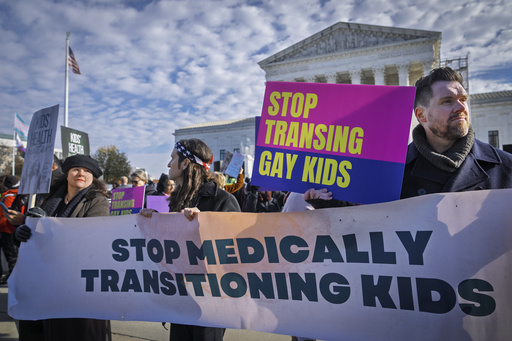WASHINGTON — On Wednesday, the Supreme Court engaged in one of its most significant cases this term, focusing on Tennessee’s prohibition of gender-affirming health care for transgender minors.
Similar legislation has emerged in various conservative states across the nation. Those opposing these laws assert that they deny necessary care to vulnerable children, while proponents defend them, claiming they protect minors from making irreversible choices.
The conservative-dominated court indicated a general inclination to uphold Tennessee’s statute, amidst a broader trend of resistance against transgender rights, particularly highlighted by President-elect Donald Trump.
What insights emerged from the discussions?
During the hearing, five of the six conservative justices expressed skepticism regarding claims that the ban constitutes discrimination against minors seeking gender-affirming treatment.
Chief Justice John Roberts and Justice Amy Coney Barrett were particularly active, frequently confronting the arguments presented by the attorneys opposing the ban. Roberts raised concerns about whether judicial entities should interfere in regulating medical practices, which are traditionally under the jurisdiction of state governments. Meanwhile, Barrett voiced doubts about the assertion that the law discriminates on the basis of sex.
Justice Neil Gorsuch, in a surprising turn, maintained silence throughout the arguments. The other three conservative justices seemed to lean in favor of Tennessee’s law, while the court’s liberal justices expressed support for the challengers, with Justice Sonia Sotomayor emphasizing the heightened suicide risk among youth experiencing gender dysphoria.
How has the court historically approached this topic?
This case marks only the second occasion the Supreme Court has deliberated a matter that serves as a critical benchmark for transgender rights.
In a prior case addressing LGBTQ+ rights, Roberts and Gorsuch, along with the liberal justices, voted to enhance protections for transgender employees. At that time, Barrett was not serving on the court, leaving no established stance on issues concerning transgender rights.
Gorsuch authored the opinion in that case, which acknowledged potential claims of discrimination in various contexts.
What can we expect moving forward?
The court is not anticipated to deliver its ruling for several months. The outcome could significantly impact the 26 states that have enacted similar bans and might influence other policies limiting participation in sports and restroom access for transgender individuals.
Advocates of the health care bans argue that gender-affirming treatments pose substantial risks and that laws should safeguard children from premature decision-making.
Conversely, opponents contend that numerous medical interventions carry some level of risk and that families should be allowed to balance those risks against potential benefits. Chase Strangio, an ACLU attorney representing three families disputing the law, noted that the rationale supporting Tennessee’s ban could similarly be leveraged to justify federal limitations.
Tennessee’s Attorney General Jonathan Skrmetti asserted that the state’s arguments would still permit each state to establish its own policies regarding these matters.


